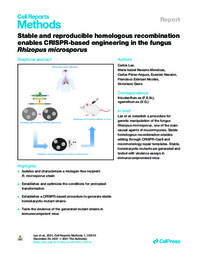Por favor, use este identificador para citar o enlazar este ítem:
https://hdl.handle.net/11000/35290
Stable and reproducible homologous recombination enables CRISPR-based engineering in the fungus Rhizopus microsporus
Título :
Stable and reproducible homologous recombination enables CRISPR-based engineering in the fungus Rhizopus microsporus |
Autor :
Navarro Mendoza, María Isabel
Lax Molina, Carlos 
Pérez-Arques, Carlos 
Navarro, Eusebio 
Esteban Nicolás, Francisco
Garre, Victoriano  |
Editor :
Cell Press |
Departamento:
Departamentos de la UMH::Producción Vegetal y Microbiología |
Fecha de publicación:
2021-12 |
URI :
https://hdl.handle.net/11000/35290 |
Resumen :
Mucormycosis is a lethal and emerging disease that has lacked a genetic model fulfilling both high virulence
and the possibility of performing stable and reproducible gene manipulation by homologous recombination
(HR). Here, we developed a new methodology to successfully perform HR in Rhizopus microsporus. We isolated an uracil auxotrophic recipient strain and optimized the critical steps in the genetic transformation of
this fungus. This was followed by an adaptation of a plasmid-free CRISPR-Cas9 system coupled with microhomology repair templates. We reproducibly generated stable mutants in the genes leuA and crgA, encoding a 3-isopropylmalate dehydratase and an ubiquitin ligase, respectively. Our new genetic model showed that mutations in the gene pyrF, a key virulence gene in several bacterial and fungal pathogens, correlated with an avirulent phenotype in an immunocompetent murine host. This was reverted by gene complementation, showing the broad possibilities of our methodology.
|
Tipo de documento :
info:eu-repo/semantics/article |
Derechos de acceso:
info:eu-repo/semantics/openAccess
Attribution-NonCommercial-NoDerivatives 4.0 Internacional |
DOI :
https://doi.org/10.1016/j.crmeth.2021.100124 |
Publicado en:
Cell Reports Methods. 1, 100124. |
Aparece en las colecciones:
Artículos - Producción vegetal y microbiología
|
 La licencia se describe como: Atribución-NonComercial-NoDerivada 4.0 Internacional.
La licencia se describe como: Atribución-NonComercial-NoDerivada 4.0 Internacional.
 La licencia se describe como: Atribución-NonComercial-NoDerivada 4.0 Internacional.
La licencia se describe como: Atribución-NonComercial-NoDerivada 4.0 Internacional.
.png)
